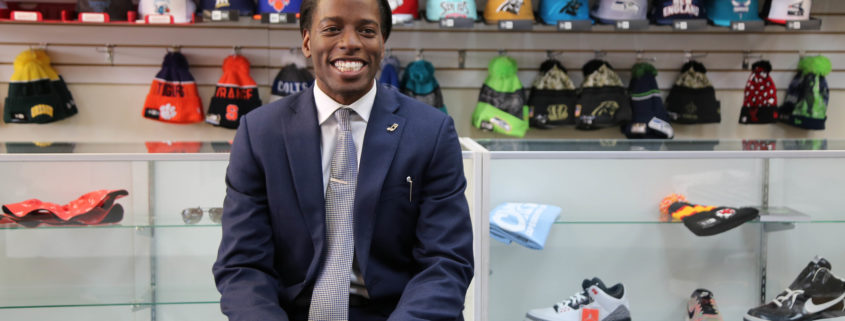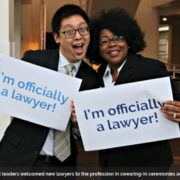Attorney-Rapper Lex-Jordan Ibegbu Relies On Both Rhyme and Reason
When summoning the confidence to impress a judge or woo a jury, young attorney Lex-Jordan Ibegbu relies on his years as a rapper growing up in Southeast Raleigh, where he spent much of his time writing rhymes and speaking his truth to crowds big and small.
“Rapping has given me a certain level of comfort when speaking to people,” he says. “MC means ‘Move the Crowd.’ When you are in court, it is similar to a stage, your crowd is the judge or the jury.”
A lifelong North Carolinian, Ibegbu, 27, attended Cary Academy and UNC-Chapel Hill before he headed south for a few years to earn his law degree at the University Of Miami School of Law. He returned home to Southeast Raleigh to begin his practice a year and a half ago, focusing on myriad areas including criminal defense, traffic court, business law, family law, entertainment, sports and government. Growing up in Southeast Raleigh shaped him, Ibegbu says.
Q: What inspired you to pursue a career as an attorney?
A: I wanted to become an attorney because I felt that with my skill set it was the best way that I could affect my community. Most of the people I admired used law as a stepping stone to affect change in their community.
In addition, I listen to a lot of Caribbean music, and I really like the songwriting of Ruben Blades who wrote socially conscious salsa songs. He subsequently became an attorney and held office in Panama while simultaneously still writing and producing amazing records.
When I was around 18, I used to do contract janitorial services with my sister. It was really hard work; she would give me some of the money if I helped her. A lot of the office spaces we cleaned were law firms. I would go in these law offices clean the toilets, desks and everything else. In my head I said ‘One day I won’t be cleaning this law office. I’ll have a big office just like this.’ ”
Lastly, many people took chances on me when they didn’t have to. A well-known attorney John Eluwa allowed me to intern with him when I was only 19 years old because I told him I wanted to be an attorney. I had no idea what I was doing; I once even locked him out of his own office. We would go to the jail to do interviews, and I knew the inmates. They would start yelling and cursing me, I would simply smirk. Although we were in the same place, I was very appreciative to be doing the interview and not be the interviewee. Life has a funny way of playing its hand.
Q: How did you begin performing as a rapper?
A: I used to listen to a lot of West African music and rock ’n’ roll. But my big brother is a huge hip hop fan. He would force feed me rap. So much so that at 6 years old my favorite album was Ghostface Killah “Ironman.” He took me to my first concert at 11 years old to see DMX perform — it was amazing. He would push me to rap over instrumentals and radio songs. And when I wrote songs he would listen to every song and review them. … We had rap groups at Ligon Middle School. We would write entire albums, create the tracklist with no instrumentals, it would all be in a notepad. Then one of my childhood friends changed the game. His name was Robert “Arok” Arukwe. Arok had recording equipment, and he would allow me to record at his house and teach me the process. One of the first songs I recorded was called “Where Da Cash At.” … I would turn the volume all the way up in my sister’s car so everyone could hear my voice. I would perform in local talent shows whenever I could get a chance, press up my CDs, sell them and shoot music videos.
Q: How does your passion for performing inform your passion for being an attorney, and vice-versa?
A: When you are in court, it is similar to a stage — your crowd is the judge or the jury. You have to rap to them. Make sure your punchlines come at the right time and your delivery and voice inflection is on point. In court you have to know your audience as if you were making music. Subsequently the use of analogies, metaphors and short quips will always win your audience over. The use of analogies, common sense riddles and stories will cause complex legal theories to be easily digestible.
Q: How did your community shape your personality when you were growing up?
A: It forced me to be humble, respectful, accountable, street smart, forward thinking, and hardworking. When I walked in someone’s house I had to speak and acknowledge the person of the house or they would chastise me as a disrespectful child. If I misspoke or became full of myself around older kids or young adults in my neighborhood there would often be consequences and repercussions. My mother forced me to speak to everyone I encountered in my neighborhood so that they would look out for me when I was by myself and/or in sticky situations. As a consequence, I learned life lessons from all types of individuals.
Q: How has your membership in the North Carolina Bar Association helped you as an attorney?
A: The North Carolina legal community is very enveloping. I attained my Florida license first, however, each state definitely has its own way. … There are so many solo practitioners, associates, and partners who I call on a frequent basis. They take time to give me guidance and advice. I am really appreciative to be able to practice in the state. It was definitely worth it.



